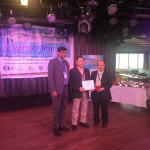Professor Tong Lin has been awarded the 2016 International Association of Advanced Materials Medal.
A 20-year career at the cutting edge of materials research has been recognised for Professor Tong Lin, ARC Future Fellow and Personal Chair within Deakin’s Institute for Frontier Materials.
Professor Lin has been awarded the 2016 International Association of Advanced Materials Medal.
The medal was presented on August 24 in Sweden at the European Advanced Materials Congress 2016, for Professor Lin’s “notable and outstanding contribution in the field of Advanced Materials Science and Technology.”
“I am very pleased to have this recognition for myself and my very hard working, energetic and productive staff and PhD students,” said Professor Lin.
The Director of the Institute for Frontier Materials, Professor Xungai Wang, congratulated Professor Lin on the achievement.
[testimonial_text]Since he arrived at Deakin in 2003, Professor Lin has helped our Institute become a world leader in research relating to nanofibres and functional fibrous materials.[/testimonial_text]
[testimonial_picture name=”Professor Xungai Wang” details=”Director of the Institute for Frontier Materials”]
 [/testimonial_picture]
[/testimonial_picture]“These materials have outstanding potential in areas ranging from environmental protection, to medicine, to defence. I am confident that Professor Lin and his team will continue to progress their work at this standard – developing applications that will make a difference to our world in the coming decades.”
After receiving his PhD in Physical Chemistry in 1998 from the Chinese Academy of Sciences, Prof Lin worked as a postdoctoral researcher in several research organisations in China, Australia and the USA, including the polymer engineering department at Akron University, USA.
He is also Associate Director for the Australian Future Fibres Research and Innovation Centre, heading nanofibres and functional fibre materials research, and a Fellow of the Royal Society of Chemistry (UK).
Of his many achievements, Professor Lin is most proud of his breakthrough work in electrospinning – using an electrical charge to create tiny fibres from a liquid.
This work has positioned Deakin University as a world leader in electrospinning and nanofibres.
He and his team designed three electrospinning machines that are now being used at the Waurn Ponds campus for R and D purposes.
In a world first, one of the machines directly processes polymer solution into continuous nanofibre yarn – opening the way for a plethora of new applications. The technology is already being used to produce high performance filters in China, and could be used to produce high tech bandages for wound healing, oil-water separation membranes, protective clothing, or even artificial blood vessels.
This year, Professor Lin’s team has published more breakthrough research in “Nature Communications” (March 2016) and Advanced Materials (February 2016). The discovery centres around the potential of two types of materials, electrospun nanofibres and conducting polymers, for harvesting small mechanical energy or sounds into electricity.
Professor Lin presented a paper on this topic at the European Advanced Materials Congress.
The team is investigating how these materials can be used to create electric power from body movements, muscle contractions, or the rotation of tyres, for instance. Such energy harvesting could be used to charge personal electronics for people without access to mains electricity or heavy batteries, like athletes or soldiers.
In addition, the materials have strong potential for converting noise into electrical current.
“Nanofibre has unique piezoelectricity,” Professor Lin explained.
“This means it is five to six times more efficient at converting sound, traffic noise or voices than conventional materials.
[testimonial_text]As one example of how this could be used, scientists could create tiny self-powered medical devices or robots that could be inserted into the body for medical purposes, such as controlling dispersal of drugs, repairing cells or detecting disease. We hope this could become a reality within 10 years.[/testimonial_text]
[testimonial_picture name=”Professor Tong Lin” details=”Institute for Frontier Materials”]
 [/testimonial_picture]
[/testimonial_picture]



